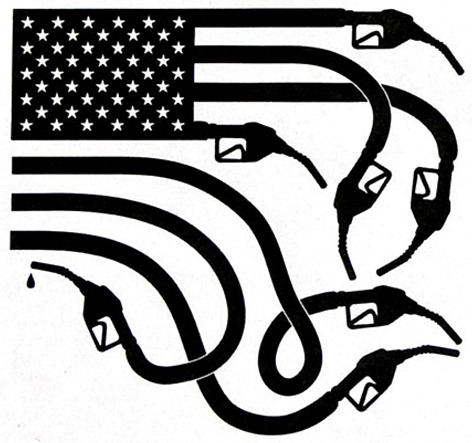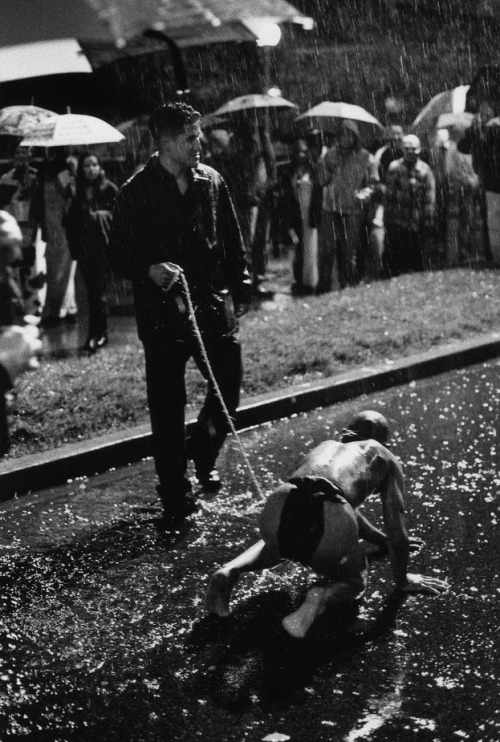
These colors don’t run, they drive.
(by Jennifer Daniel)


White Sands Sunset Series by mstoy on Flickr.
All Work and No Pay: The Great Speedup:You: doing more with less. Corporate profits: Up 22 percent. The dirty secret of the jobless recovery.
Also read harrowing first-person tales of overwork and 12 charts on just how much is being demanded of American workers.
On a bright spring day in a wisteria-bedecked courtyard full of earnest, if half-drunk, conference attendees, we were commiserating with a fellow journalist about all the jobs we knew of that were going unfilled, being absorbed or handled “on the side.” It was tough for all concerned, but necessary—you know, doing more with less.
“Ah,” he said, “the speedup.”
His old-school phrase gave form to something we’d been noticing with increasing apprehension—and it extended far beyond journalism. We’d hear from creative professionals in what seemed to be dream jobs who were crumbling under ever-expanding to-do lists; from bus drivers, hospital technicians, construction workers, doctors, and lawyers who shame-facedly whispered that no matter how hard they tried to keep up with the extra hours and extra tasks, they just couldn’t hold it together. (And don’t even ask about family time.)
Webster’s defines speedup as “an employer’s demand for accelerated output without increased pay,” and it used to be a household word. Bosses would speed up the line to fill a big order, to goose profits, or to punish a restive workforce. Workers recognized it, unions (remember those?) watched for and negotiated over it—and, if necessary, walked out over it.
But now we no longer even acknowledge it—not in blue-collar work, not in white-collar or pink-collar work, not in economics texts, and certainly not in the media (except when journalists gripe about the staff-compacted-job-expanded newsroom). Now the word we use is “productivity,” a term insidious in both its usage and creep. The not-so-subtle implication is always: Don’t you want to be a productive member of society? Pundits across the political spectrum revel in the fact that US productivity (a.k.a. economic output per hour worked) consistently leads the world. Yes, year after year, Americans wring even more value out of each minute on the job than we did the year before. U-S-A! U-S-A!
Except what’s good for American business isn’t necessarily good for Americans. We’re not just working smarter, but harder. And harder. And harder, to the point where the driver is no longer American industriousness, but something much more predatory.
Sound familiar: Mind racing at 4 a.m.? Guiltily realizing you’ve been only half-listening to your child for the past hour? Checking work email at a stoplight, at the dinner table, in bed? Dreading once-pleasant diversions, like dinner with friends, as just one more thing on your to-do list?
Guess what: It’s not you. These might seem like personal problems—and certainly, the pharmaceutical industry is happy to perpetuate that notion—but they’re really economic problems. Just counting work that’s on the books (never mind those 11 p.m. emails), Americans now put in an average of 122 more hours per year than Brits, and 378 hours (nearly 10 weeks!) more than Germans. The differential isn’t solely accounted for by longer hours, of course—worldwide, almost everyone except us has, at least on paper, a right to weekends off, paid vacation time (PDF), and paid maternity leave. (The only other countries that don’t mandate paid time off for new moms are Papua New Guinea, Sierra Leone, Liberia, Samoa, and Swaziland. U-S…A?)
To understand how we got here, first let’s consider the Ben Franklin-Horatio Alger-Henry Ford ur-myth: To balk at working hard—really, really hard—brands you as profoundly un-American. Who besides the archetypical Japanese salaryman derives so much of his self-image from self-sacrifice on the job? Slacker is one of the most biting insults available in polite company.
And so we kowtow to—nay, embrace—a cultural maxim that just happens to be enormously convenient to corporate America. “Our culture has encouraged me to only feel valuable if I’m barely hanging on to my sanity,” one friend emailed as we were working on this article. In fact, each time we mentioned this topic to someone—reader, source, friend—they first took pains to say: I’m not lazy. I love my job. I come from a long line of hard workers. But then it would pour out of them—the fatigue, the isolation, the guilt.
“I am exhausted,” said a “part time” college instructor in Illinois. “I can’t help my son with his homework because I am grading papers until late into the night. I get up very early during the week, skip lunch to save not money but time, and the workload never lets up. My employer uses and abuses full-time employees even more so than those of us that are hourly. My supervisor, for example, runs a large department. He was just promoted to a new, even more demanding position, but his position running the department will not be filled. He will now be doing what is a 60-to-70-hour job ‘on the side.’ I can’t complain of overwork, because everyone is competing to get enough classes to pay the bills. If you lose a class, you lose a chunk of your paycheck. If we can’t handle it, the class can always be given to another teacher who will be desperate for the work or money.”
Continued here: http://motherjones.com/politics/2011/06/speed-up-american-workers-long-hours

Domus magazine has published an article and accompanying set of graphics that display some crucial information released by Wikileaks late last year. According to the article, its purpose is as follows:
Mapping the discontinuous spatiality of the contemporary nation-state through the publication of the secret government memo listing 259 facilities around the world considered crucial to everyday life in the US
Although the graphics couldn’t have been laid in a more confusing way, it’s interesting to see just how far-reaching America’s interests span. From “border crossing” areas in the middle of Mexico (where there’s nary a border in sight), to tightly-spaced “telecommunications hubs” all over Europe and Japan, there are hundreds of sites around the globe that have deemed vital to our national security without being anywhere near the, you know, nation. In the modern globalized world in which we exist, this is anything but surprising, and I hope one day these graphics can be made a bit more interactive (and aesthetically logical), so even more information like this can be released to the public.
Wikileaks FTW.
We Must Educate All Our Young Men:One out of every two men that graduate HS between the ages of 15 and 24 will be incarcerated, unemployed, or dead. This makes me seriously fear for my students, all of which are people of color and a little less than half of them being men. It’s crazy that this problem has gotten so bad for men of color that the President of the College Board chose to write about it.

i couldn’t have planned this
photo (c) me


Our “amped intern” over here at MetroLyrics purchased The United States of America’s debut album back in ‘95, where this classic tune is from. Sing along here!




No comments:
Post a Comment